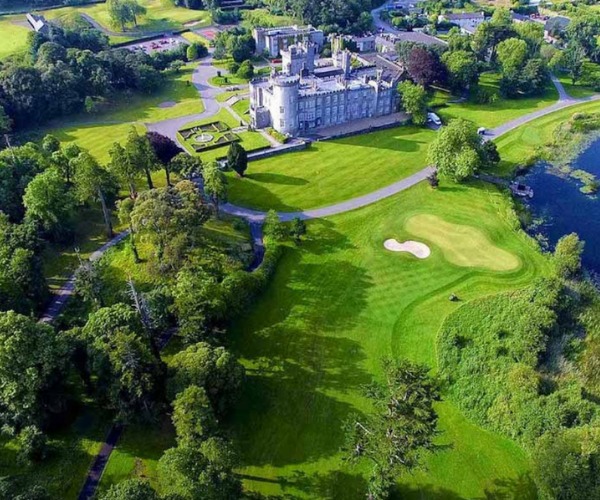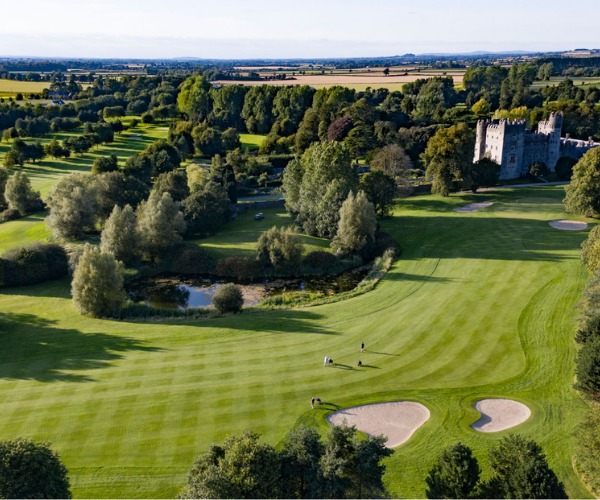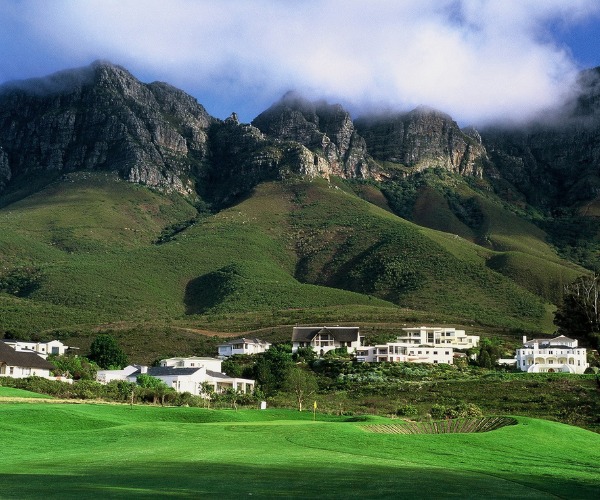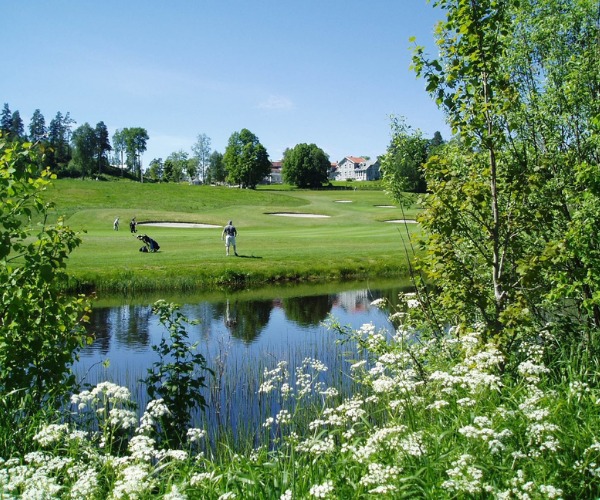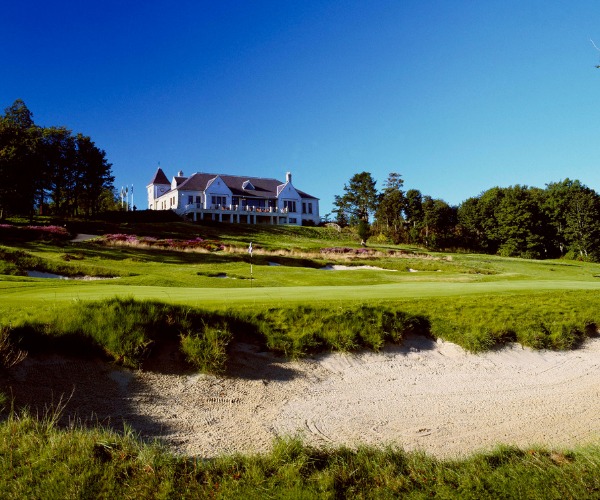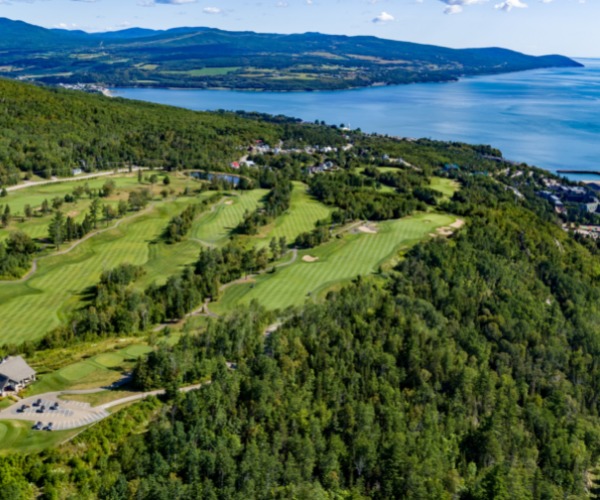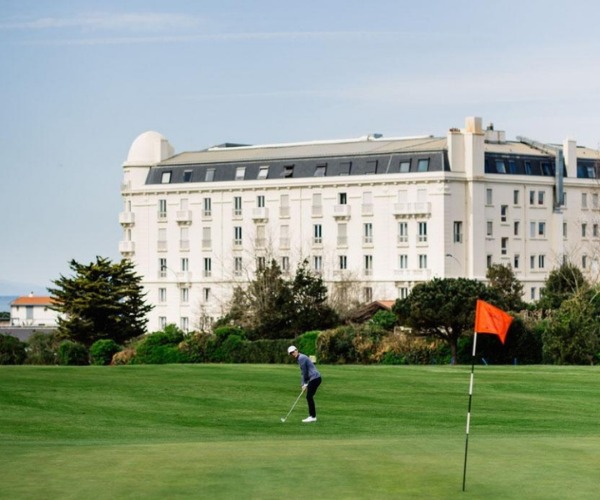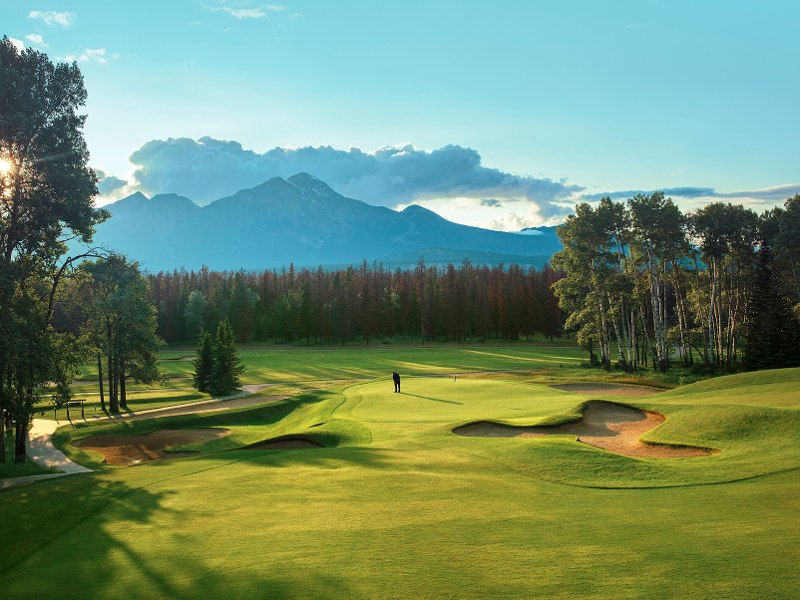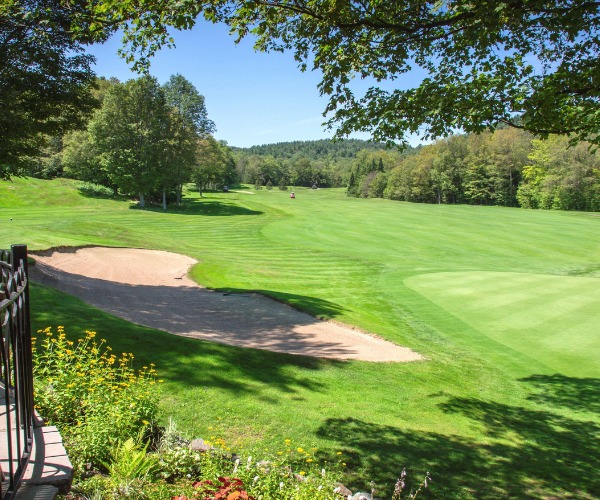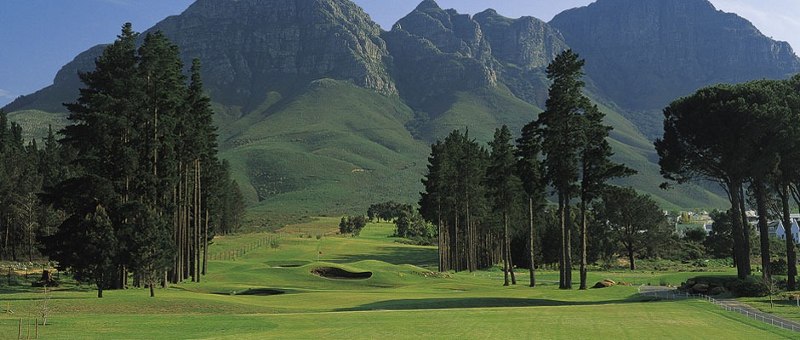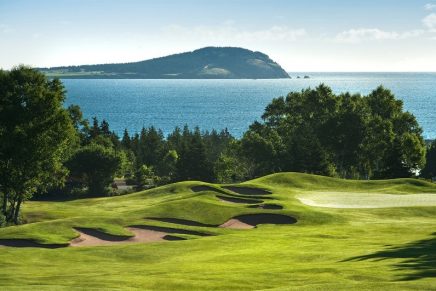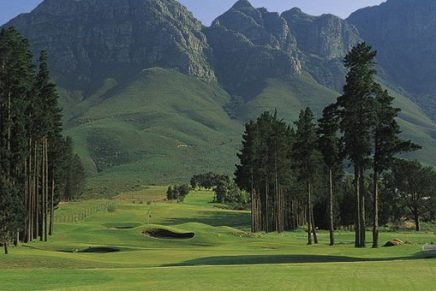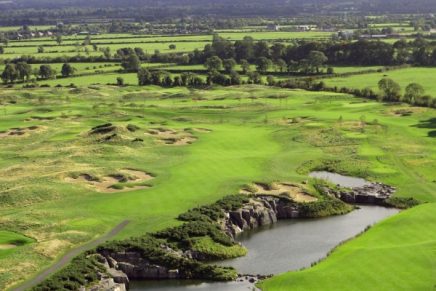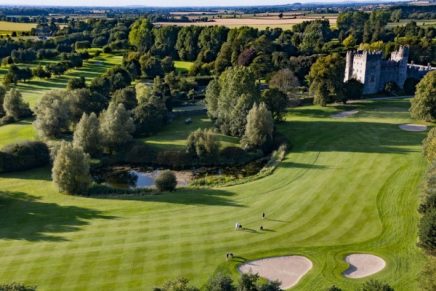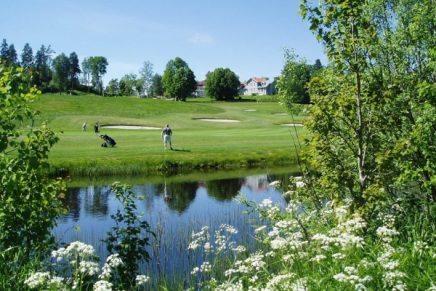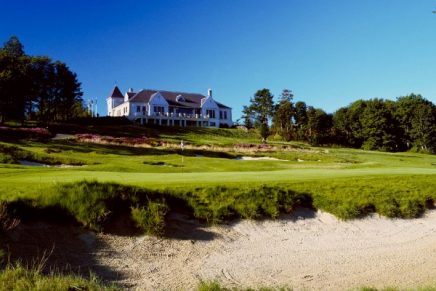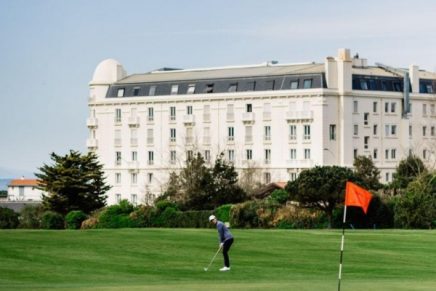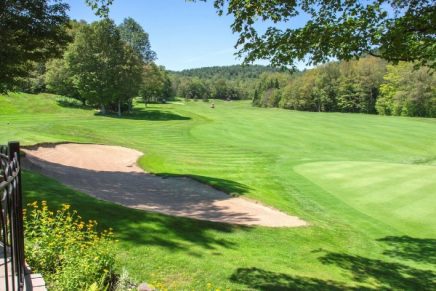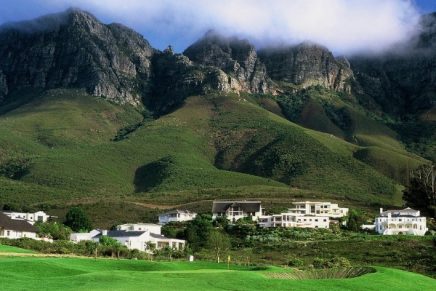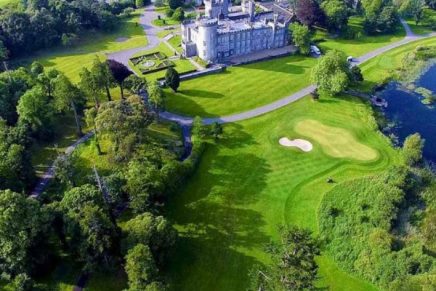Historic Hotels Worldwide offers golfers and heritage tourists a unique collection of hotel resort destinations, ones with historic golf courses in Canada, Ireland, Scotland, France, Norway, and South Africa. Many of these courses were designed by the leaders of golf course architecture and of the game in their own times.
Four historic hotels featured in the 2022 Top 12 Historic Hotels Worldwide Most Historic Golf Courses list have golf courses designed by Stanley Thompson, who co-founded the American Society of Golf Course Architects in 1946 and is considered a “founding father” of modern American golf. Arnold Palmer, Gary Player, and Peter Nordwall are also represented here.
Golf history buffs will not be surprised to see the Old Course Links at St. Andrews—the world’s oldest and most famous golf course–included for its proximity and close association with the historic Old Course Hotel, Golf Resort & Spa. Each course has earned its reputation for its beautiful landscapes and views, and for the many famous people who have played them: world leaders, golf champions, artists, and film and entertainment celebrities. Today, travelers around the world can make their own history as they stay and play where champions have played.
The K Club (550) Straffan, County Kildare, Ireland
Originally part of the Straffan Estate, The K Club was once a simple country manor in the heart of County Kildare. Inducted into Historic Hotels Worldwide in 2014, the estate dates to the 6th century and beautiful Straffan House manor dates to 1832. In the 1980s, investors heavily renovated the grounds to create a luxurious resort called “The K Club.” Among the renovations was the development of two massive, championship-caliber golf courses, designed by legendary U.S. golfer Arnold Palmer. The golf courses are simply known as Palmer North and Palmer South. The Palmer North Course ranks regularly in the top three parkland golf courses in Ireland. It is considered one of Ireland’s bucket-list courses and has hosted some of the world’s top golf championships including the Ryder Cup in 2006, the 2016 Dubai Duty Free Irish Open – where Rory McIlroy made the European Tour Shot of the Year – and 13 European Opens.
The Palmer South Course is an inland links course with dramatic dune-style mounding. This assists in making the course into a true Championship Golf Course with many vantage points for spectators to view golf professionals at work. This course has hosted some of golf’s most exciting moments. Who could forget the excitement of the 2007 Smurfit European Open? Colin Montgomerie ended his 18-month losing streak at The K Club, going on the 18th to win the 2007 European Open by just one shot. Magical moments are created and forever remembered on The K Club’s Palmer courses.
Dromoland Castle Hotel (1014) Newmarket-on-Fergus, County Clare, Ireland
The historic Dromoland Castle Hotel’s Golf & Country Club is the stuff of which golfers’ dreams are made: an impressive 18-hole, par 72 championship course set on a magnificent 450-acre Irish estate where gentle hills, ancient trees, and unexpected water hazards present challenges and thrills. Inducted into Historic Hotels Worldwide in 2011, Dromoland Castle Hotel in County Clare, Ireland, dates to the 11th century and it was only in 1961 that the first golf course was established on its grounds. That year, U.S. golf architect Brook L. Wigginton designed a nine-hole course. In 2003, the mid-20th century course was revitalized and restored as a championship golf course for the 21st century by golf course architect Ron Kirby and Irish golfing legend J.B. Carr. They bestowed upon Dromoland Castle Hotel one of the finest Irish parkland courses open today. The signature hole, the 7th hole from an elevated tee, overlooks Dromoland Lake with the castle in the background to create a setting for the ages. Deer often venture towards the lakeshore for a drink, different breeds of pheasant can be seen in the hundreds all over the course, while the whole surrounding woodland is rich in a chorus of birdsong. Between 1991-1992, Dromoland was the home of the Whyte and McKay Pro Celebrity Golf Tournament. During this time, such noted players as Gary Player, Sandy Lyle, Sam Torrance, and Hale Irwin all played on the course. In 2022, Dromoland Castle is delighted to announce the return of the Women’s Irish Open from 22nd to 25th September 2022. This will be the first-time women’s professional golf will be played in Ireland since 2012.
Kilkea Castle (1180) Castledermot, County Kildare, Ireland
Kilkea Castle in County Kildare, Ireland, blends its historic past with contemporary elegance in a 180-acre setting of a romantic Irish castle, bucolic woodland, formal gardens, and championship golf course. The estate was established in 1180 and was inducted into Historic Hotels Worldwide in 2020. The Kilkea Golf Course (18-hole, par 70) was developed in the 1990s in this magnificent setting, in the shade of the 12th-century castle—the longest continuously inhabited castle in Ireland. It is a parkland course designed by architects Jack McDaid and Jim Cassidy and was designed so that the splendor of the castle can be viewed from every fairway. In constructing this championship course, the designers cleverly used the River Griese as a natural hazard flowing through the castle grounds and estate.
The combination of this waterway and a variety of other hazards and interesting greens ensures the golfer playing this 18-hole, par 70 course has a considerable challenge on his or her hands. Players encounter the river at almost every hole. Two lakes have also been included in the course design, adding to the overall difficulty of the challenge of this royal and ancient game. The course’s record was set by Irish professional Damien McGrane, who shot an incredible 64. The Clubhouse at Kilkea Castle overlooks the 9th hole with occasional glimpses of the historic 12th-century castle.
Erinvale Estate Hotel & Spa (1666) Cape Town, South Africa
The luxury holiday destination Erinvale Estate Hotel & Spa was inducted into Historic Hotels Worldwide in 2018, and the European settlement of the estate–which once included the neighboring golf course—dates to the Dutch colonization of South Africa in the mid-17th century. Designed by Gary Player, the Erinvale Golf Course opened in 1995 and immediately prepared to host the 1996 World Cup of Golf, where thirty-two participating nations competed. The international golfers found the course both a golfing challenge and a visual delight. In 2005, Erinvale hosted the SAA Open, highlighting South African golfing talent. Player was a world-renowned professional golfer, known widely as the only non-American to win all four majors to date and one of the youngest to achieve the career Grand Slam of golf. His 18-hole Erinvale Golf Course quickly became renowned throughout the golf world. The first nine holes run through beautiful estates and the second nine are set among mountains and beautiful views of False Bay. For visitors, the clubhouse offers golf cart rentals and an outstanding Pro Shop. Operating separately from the golf course, the hotel holds memberships at Erinvale Golf Club and offers its guests preferential rates.
Losby Gods (1744) Finstadjordet, Akershus, Norway
Situated a short drive from Oslo city center, the historic Losby Gods hotel (inducted into Historic Hotels Worldwide in 2012) offers a refreshing respite with beautiful scenery and lush green hills. Tucked away in those hills are the Losby Gods golf courses: Østmork, an 18-hole championship course, and Vestmork, a nine-hole course, both designed by Peter Nordwall, a renowned Nordic golf professional and golf course architect. The championship course is perfectly integrated alongside the meandering path of the Losby River that runs through the valley. This intentional and playful design, combined with the size and quality of the greens, makes Østmork one of the finest in Norway. Compact and challenging, Vestmork balances the championship course as a worthy alternative for a quick game. The two courses are complemented by a 72-bay, floodlit driving range, two putting greens, and a short game area. The driving range is open to all players, but the greens and short game areas are reserved for the club members and their guests. Indoors, golf simulators allow guests to explore and experience amazing and challenging golf courses from all over the world. Venturing out, guests discover the majesty of the surrounding Østmarka Nature Preserve. This verdant preserve extends for some 7.7 sq miles and is among the best places around Oslo to see the country’s unique native wildlife.
Old Course Hotel, Golf Resort & Spa (1852) St Andrews, Scotland, United Kingdom
A member of Historic Hotels Worldwide since 2017, the Old Course Hotel, Golf Resort & Spa, is among the best destinations to visit in northern Scotland and a must for serious fans of the Scottish game. Located in downtown St Andrews, this fantastic historic hotel sits just steps away from the renowned Old Course St Andrews Links— the world’s oldest golf course, first established in the 15th century. The Old Course Hotel opened in the 1960s to cater to the throngs of golf enthusiasts who had routinely travelled to the site year after year. For nearly 60 years, the Old Course Hotel, Golf Resort & Spa has hosted thousands of holiday goers and golfers alongside the most famous golf course in the world, which is on public land and managed by the St Andrews Links Trust. Guests of the Old Course Hotel can purchase Suite Golf packages for a guaranteed tee time or look at the alternative options outlined on the St Andrews Links Trust website. The resort hotel also provides access to its own championship course: The Duke’s Golf Course, established in 1995 and designed by Peter Thomson, who was a five-time Open Championship winner and the only golfer to win a modern major three times in succession. It was then revised and renovated by Tim Liddy in 2006 to complement the five classic links courses along the coastline and to enhance St Andrews as the leading destination for golfers. The 18-hole course is set up as two loops of nine holes – enabling the resort’s golf professionals to change the course’s layout to suit multiple formats and competitions. It was home to the 2014 European Amateur Championship. There are many more golf courses around the hotel, where the concierge helps guests arrange tee times as well as transfer services for them all.
Fairmont Banff Springs (1888) Banff, Alberta, Canada
Fairmont Banff Springs is the luxury stop in the heart of Canada’s Banff National Park, a UNESCO World Heritage Site in Canada’s Rocky Mountains. Inducted into Historic Hotels Worldwide in 2018, the hotel was built by the Canadian Pacific Railway in 1888 to pursue a grand vision of opening the Canadian west to tourists. One of its historic amenities is its public golf course, which features a captivating and challenging layout that offers a breathtaking view in every direction. Golf course architect Stanley Thompson was hired to design the Banff Springs course in 1928. Thompson gifted holiday golfers at Fairmont Banff Springs with an 18-hole course and a thrilling game of optical illusions created by the surrounding mountains. The Stanley Thompson Course winds along the Bow River under the snow-capped peaks of Sulphur Mountain and Mount Rundle. In 1989, Fairmont Banff Springs’ Thompson Course was complemented with the construction of the Tunnel Mountain Course, an adjoining nine-hole, par 36 course designed by Cornish and Robinson. When booking, ask the golf pro shop about the club’s heritage golf experience. The resort occasionally facilitates a unique opportunity for any golfer wishing to take a step back in time and experience golf like it was in the late 1930s, assigning caddies and forecaddies dressed in period clothing, the opportunity to rent hickory golf clubs, and education on the history of golf in Banff. Ask about this special package when reserving a tee time.
Fairmont Le Manoir Richelieu (1899) Charlevoix, Quebec, Canada
The Fairmont Le Manoir Richelieu in Quebec, Canada, overlooks the picturesque St. Lawrence River on top of Pointe-au-Pic, an area known for its hospitality and inspiring landscapes. The historic hotel was established in 1899 to accommodate the travelers who wanted to see the stunning geography for themselves. In the early 1920s, the hotel owners commissioned a famous British golf course architect and a founding member of the American PGA, Herbert Strong, to build a new course. Located on a mountainside at an altitude of 300 meters (about 984.25 ft), the historic golf course was inaugurated on June 18th, 1925, by U.S. President William Howard Taft. Many international tournaments, including the Manoir Richelieu Shield, have been held there since. From 1928 to 1965, amateur players from all over the Americas competed for the honors of this competition. The last tournament hosted at the Fairmont Le Manoir Richelieu golf course was the 59th Canadian Senior Men’s Championship in September 2021. Between 2002 and 2004, $14 million was invested in the development of a new nine-hole golf course (the St. Lawrence Course), the modernization of the existing eighteen-hole course (the Richelieu and Tadoussac Courses) and the construction of a new clubhouse – which is accessible only by golf cart. Renowned golf architect Darrell Huxham designed the renovated links in 2004, paying homage to the 1925 Herbert Strong original. Today, Fairmont Le Manoir Richelieu is home to 27 holes of world-class golf. At every point, golfers may admire the landscape and views of the St. Lawrence River. The panorama is breathtaking. President Taft said of the region’s beauty, “it is intoxicating as champagne, yet without the hangover.”
Le Régina Biarritz Hôtel & Spa – MGallery (1907) in Biarritz, France
A member of Historic Hotels Worldwide since 2018, Le Régina Biarritz Hôtel & Spa – MGallery has been one of France’s most renowned holiday destinations for more than a century. Le Régina hotel was established in the fashionable Atlantic coast town of Biarritz in 1907, when Europe’s illustrious class was flocking there for sea, air, and sun. Since its opening, the hotel has maintained a partnership with the Golf du Phare golf course. This golf course was built in 1888 by the architect Willy Dunn, initially to serve British tourists and local ex-pats. Golf provided a foundation for the hotel’s success, ensuring a steady stream of enthusiasts for the growing sport. From La Belle Époque to the present day, some of the best European players—including royals, like Kings Edward VII and Alfonso XIII—have played here. Golf du Phare’s 18-hole, par 69 course offers players a game within the town center and close to the hotel, while never straying far from a glimpse of the ocean. The course has a challenging, technical nature: its 70 bunkers are strategically placed, greens are fast, and the rough is very discreet. Only two hours from Bordeaux, Le Régina Biarritz Hotel – MGallery offers the opportunity to enjoy a golf holiday of great diversity which will satisfy a broad public. Le Régina offers golf lovers an exclusive golf holiday offer, which includes accommodation in a double room, green-fees, buffet breakfast overlooking the bay and its iconic surfers, as well as a shuttle service offered between the hotel and clubhouse.
Fairmont Jasper Park Lodge (1922) in Jasper, Alberta, Canada
Situated in Alberta’s magnificent Jasper National Park, a UNESCO World Heritage site, the Fairmont Jasper Park Lodge opened in June 1922 with eight log cabins and the main building being billed as the largest single-story log structure in the world. Fairmont Jasper Park Lodge was inducted into Historic Hotels Worldwide in 2018. The premier golf course was built soon after the lodging opened, on land cleared by 50 teams of horses and 200 men, working together for a year to remove boulders and debris for greens and fairways. Stanley Thompson, Canada’s master golf course architect, displayed some of the finest work of his career with the design. Their efforts paid off: since 1925, this jewel set deep in the heart of the Canadian Rockies has been the setting of unforgettable memories for all of those who come to play. The 18-hole layout offers elevated tee boxes, dramatic bunkering and holes aligned with distant mountain vistas. Thompson designed wide fairways that carve through thick forest, and maintain a partnership with the environment’s natural contours, blending beautiful landscapes with challenging terrain. Among the celebrities and royalty who stayed at the resort, golf-loving Bing Crosby particularly adored the course, and he was often spotted walking its fairways. Crosby even went on to win the Jasper Park Lodge’s Totem Pole Tournament in 1947 and the resort honors him today with the guestroom named the Crosby Cabin. Today, this award-winning Alberta golf course remains one of the “must play” courses in Canada and is open to guests of the Fairmont Jasper Park Lodge. While on the course, keep an eye out for wildlife: elk and bear sightings are common for players.
Fairmont Le Chateau Montebello (1930) Quebec City, Quebec, Canada
The historic Fairmont Le Château Montebello Golf Course winds tightly through Quebec’s graceful forests and features dramatic elevation changes – captivating the imagination of golfers from all over the world. Designed by U.S. golf course architect Stanley Thompson in 1929, the golf course has been a jewel in the crown of Fairmont Le Château Montebello since the historic resort opened in 1930. This golf course remained the private domain of the prestigious Seigniory Club until 1970 and today the Fairmont Le Château Montebello golf club is among the best public courses in Quebec. It was previously a private club for the elite worldwide, the Seigniory Club hosted many dignitaries and celebrities through its years, ranging from Bing Cosby to Rainier III, Prince of Monaco. In June 1948, Sardar Wardit Singh Malik, High Commissioner for India to Canada was spotted on the links, enjoying the fairways and greens. In 1944 and 1949, the course was home to the Canadian PGA (Professional Golf Association) Championship.
The hotel was inducted into Historic Hotels Worldwide in 2018, and in 2022 its public golf course remains open to guests of all levels and ages. Golfers are invited to discover how Thompson’s expertise in designing wilderness golf is apparent at each hole, where players are secluded and held by the woods as if their group was the only one playing. On all sides, the forest of fragrant pine, spruce, and balsam encroach. Some of its elevated tees provide lovely views of the gentle rolls of the surrounding mountains. Out of a wilderness of rocks, trees, and shrubs, Thompson carved out undulating fairways and emerald-like greens, traversing ravines, and valleys. The panoramic views from the elevated tee at the 4th hole are a highlight on the front nine while, on the inward half, one of the more memorable holes is played at the 14th, where a tributary of the Ottawa River protects the front green.
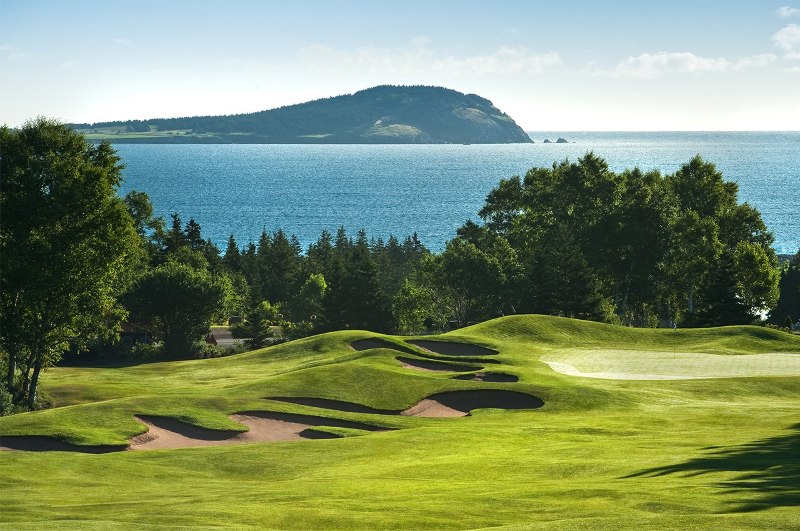
Keltic Lodge Resort and Spa (1940) Ingonish Beach, Nova Scotia, Canada; @golfcapebretonhighlands.ca/
Keltic Lodge Resort and Spa (1940) Ingonish Beach, Nova Scotia, Canada
The Keltic Lodge Resort and Spa and the Cape Breton Highlands Links golf course were established at the same time on the edges of Canada’s beautiful Cape Breton National Park in 1940. The Canadian National Park Service hired golf course architect Stanley Thompson in 1939 to design and build a stunning 18-hole, par 72 golf course that would take advantage of its setting in one of the country’s most scenic and awe-inspiring national park. Thompson—well-established as the architect of golf courses at Fairmont Banff Springs, Fairmont Le Château Montebello, Fairmont Jasper Park Lodge, and elsewhere—was eager to place a golf course on the wild peninsula where the Atlantic emptied into the Cabot Strait. Thompson routed the course to follow the Clyburn River between the mountains and the sea. Construction progressed quickly, taking just two years. It was difficult to bring machinery to the remote site and local laborers did much of the work by hand. Many have referred to Cape Breton Highlands Links as Thompson’s homage to golf’s Scottish roots and St. Andrews in particular. Holes have names like “Heich O’ Fash” (“Heap of Trouble”) and the seventh hole, Killiecrankie, resembles the long narrow pass of Killiecrankie in the Highlands of Scotland—a wooded gorge that played a significant role in Scotland’s history in 1689. Keltic Lodge Resort and Spa was inducted into Historic Hotels Worldwide in 2014 and offers guests unparalleled access to this historic golf course.


